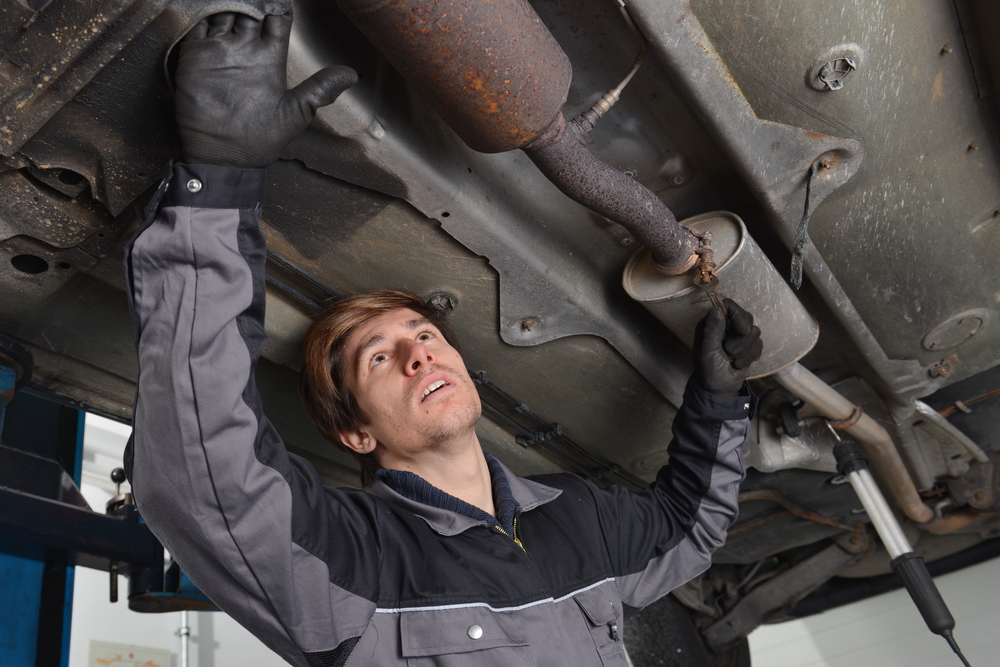 A catalytic converter is one of the most important parts of a vehicle’s emissions control system, preventing harmful exhaust pollutants from entering the atmosphere by converting them into water vapour and less harmful gases. Bosal Automotive & Industrial Components, one of the world’s major suppliers of complete exhaust systems, offers garage and workshop technicians some key maintenance and care tips for catalytic converters.
A catalytic converter is one of the most important parts of a vehicle’s emissions control system, preventing harmful exhaust pollutants from entering the atmosphere by converting them into water vapour and less harmful gases. Bosal Automotive & Industrial Components, one of the world’s major suppliers of complete exhaust systems, offers garage and workshop technicians some key maintenance and care tips for catalytic converters.
DO . . .
- Use the correct fuel and oil for the customer’s car – it will prevent damage to the cat. Believe it or not, at least 150,000 people mistakenly put the wrong fuel into their vehicles each year – that works out at one every three and a half minutes!
- Ensure the car is regularly serviced to the vehicle manufacturers’ specifications – in particular, make sure the engine is running correctly. The cat will not convert if the engine is inadequately tuned. Poor engine maintenance can cause the monolith to break down, melt or become covered in soot.
- Inform your customers that parking over long grass or anything similar is a no-no. The catalytic converter can actually set the grass on fire as it operates at such a high temperature!
- Also make customers aware of driving carefully over speed humps as their exhaust system can easily be grounded, which could then cause impact damage to the cat. This can cause cracks in the ceramic monolith which will end up in the cat brick breaking apart.
DON’T . . .
- Use a fuel additive without first reading the instructions to find out if it is compatible with a catalytic converter. Consult the manufacturer of the additive if there’s any doubt..
- Attempt to bump start or tow the car. The monolith can overheat and melt as this causes unburned fuel to be injected into the catalytic converter.
- Apply exhaust paste in front of a catalyst when fitting. Exhaust paste can break off in chunks and damage the monolith when it hardens. Paste dust can also block the monolith. Exhaust paste also contains silicone which will poison the cat.
- Tow anything that is too heavy for the vehicle to cope with. If, for instance, a caravan is overloaded, the extra weight will push a car along when it travels downhill. This can cause the monolith to overheat and melt, as it sends unburned fuel into the exhaust system.
Want to find out more?
For all technical queries relating to Bosal Exhaust Systems, please contact the Technical Help Desk on 0800 374710. For further details on Bosal Automotive & Industrial Components, please call 01772 771000 or email baic@eur.bosal.com. Alternatively, visit www.bosal.co.uk to find the latest products.
For more information, interviews or images please contact:
Claire Brown, Hornby Whitefoot PR
Tel: 07787 505963 E-mail:claire@hornbywhitefootpr.co.uk
About Bosal Automotive & Industrial Components Ltd
BAIC Ltd was created in 2013 as the wholly owned Sales and Distribution arm of Bosal Group in the UK. Bosal Group was established in 1923 in Alkmaar, Netherlands. The annual turnover in 2014 was in excess of € 714 million. The Bosal Group employs over 4.900 people in 34 manufacturing plants and 18 distribution centres. Bosal´s customer base includes all major car manufacturers worldwide as well as a variety of leading industrial conglomerates.
Bosal has been trading in the UK since 1977, from the same site in Preston, Lancashire. BAIC Ltd stock an extensive range of Bosal manufactured Emission Control Systems including Silencers, Pipes, Catalytic Converters and Diesel Particulate Filters. Additionally, BAIC Ltd also stock a wide range of Towbars – Flange, Swan Neck and Detachable – as well as Electric Sets and Accessories, Cycle Carriers and Roofbars.
Further information can be found at either www.bosal.co.uk or www.bosal-towbars.co.uk.
